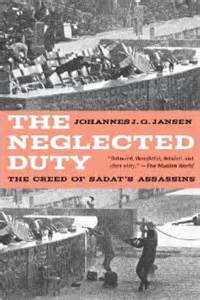|
Reviewed by Norvell B. DeAtkine, Colonel (USA Retired), Consultant This book is an important one for those interested in the intellectual mind-set of the Jihadi mentality and their method of arriving at a comfort zone in the complex and complicated maze of Islamic theology. The author must be given credit for attempting to make readable and understandable tortuous and contradictory Islamist thinking and self-justification for the brutality becoming the new norm with Islamist radicals. He centers in on the assassination of President Sadat in October 1981, an event at which this reviewer was present. The author, who is a renowned Islamic scholar, updated this book, originally published in 2008, with a new preface that is a brilliant piece of stand-alone literature. His indictment of the Western apologists for radical Islamists is particularly illuminating and prescient. He takes to task, “the credulity and gullibility of many Western observers of Islam and the Middle East….”. As Professor Janssen points out, the Muslim Brotherhood has become adept at presenting an innocuous and moderate appearance, concealing its true objectives. He clearly expounds his view that the Muslim Brotherhood is the most dangerous of the Jihadi Islamist movements. The book is written around an analysis of a document called the Al Faridah al-Gha’ibah which Dr. Janssen identifies as the Creed of Presidents Sadat’s assassins in October 1981. Professor Janssen’s exploration of the impressive “coherence and logic” of the al-Faridah document provides illumination on the motivation and justification of the killers and the generations of jihadis to follow. Having resided in Cairo for some time, the author skewers one element of conventional wisdom that has been a staple since the time of the assassination. Sadat was unpopular among much of the population but it had little to do with the treaty with Israel as so many pundits and Middle East observers have maintained. As the Faridah makes clear, Sadat was considered the greatest of Islamic villains, a Muslim hypocrite ruling in a Muslim land in a non-Islamic manner. He was compared to the Mongol rulers of the Islamic world, nominally Muslim, but imbibers of alcohol. The author of the Creed reiterates that the “near enemy” (Sadat) is the greatest threat, not the Zionists. The strategy was essentially to create a safe haven “caliphate” and expand from it by use of the sword. All, whatever their religion, were to be administered by Sharia law. The author of the Faridah emphatically asserts a traditional Islamist belief that the world will never be peaceful until the house of war (non-Islamic world) is conquered by the house of peace (the Islamic world). They subscribe to the belief that the “neglected duty” is the passivity of the Muslim community in establishing a worldwide Islamic Caliphate. Moreover, the author denies the idea advanced by many moderate fundamentalists that this can be done by peaceful integration within the democratic system or by propaganda. This conversion can only be done by the sword, a belief succeeding generations of radical Islamists adhere to rigidly. Peaceful conversion is not possible. In fact, the author of the Creed ridicules Western apologists for Islam who ascribe this radical doctrine as essentially non-Islamic. Al Azhar, the center of official Sunni Islam, has long been considered the supreme institutional authority of Islamic law, and graduates are the cream of Sunni clerics. As such, the Sheikh of Al Azhar is the titular final authority on the Sunni interpretation of law. In response to the Creed, the Grand Mufti, Sheikh Abd al-Halim, wrote a point-by-point rebuttal. His erudite response, while tepid in condemning the assassination itself, should be considered the mainstream Islamic thinking on the Jihadi Creed. However, as the various radical Islamist groups have made clear, they reject the more moderate hadiths and Qur’anic teaching, insisting on their own interpretation. As Professor Janssen asserts, the clarity and logic of the Creed is such that, “Without Mufti’s fatwa on the Faridah it would be difficult not to believe that militant Islam is becoming mainstream Islam.” In the final chapters, Professor Janssen, explores the reactions of the large Sufi element in Egypt, and the profiles and impact of two famous Egyptian clerics, Sheikh Abdi-al–Hamid Kishk, a mystic and advocate of personal piety, and Sheikh Muhammad Mutawali al – Sha’rawi, a showy televangelist who believed that God ordained the death of Sadat but also ordained that the assassins would not take control of Egypt as Sha’rawi believed they intended. Finally, concludes the author, liberalism is weakening and the belief that Islamic law must be applied universally is growing stronger. |


 The Neglected Duty: The Creed of Sadat’s Assassins
The Neglected Duty: The Creed of Sadat’s Assassins